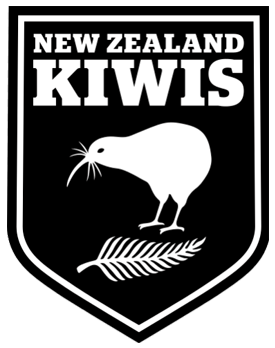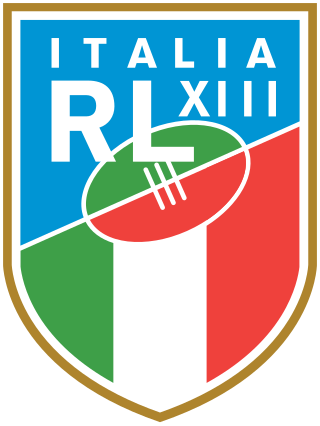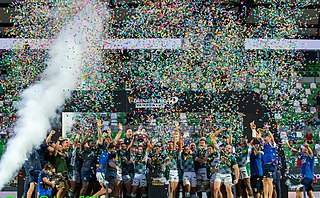Related Research Articles

The Rugby Championship, formerly known as the Tri Nations Series (1996–2011), is an international rugby union competition contested annually by Argentina, Australia, New Zealand, and South Africa. These are traditionally the four highest ranked national teams in the Southern Hemisphere; the Six Nations is a similar tournament in the Northern Hemisphere.

The Ireland men's national rugby league team, known as the Wolfhounds, is organised by Rugby League Ireland and represents the entire isle of Ireland in international rugby league. The representative team is composed largely of players of Irish descent who compete in the Super League as well as the Australasian National Rugby League. Ireland is also represented by an Ireland A side, which is made up of players from the Irish domestic competition.

The United Rugby Championship (URC) is an annual rugby union competition involving professional teams from Ireland, Italy, Scotland, South Africa, and Wales. For sponsorship reasons the league is known as the Vodacom United Rugby Championship in South Africa, and the BKT United Rugby Championship in the competition's other territories, the split branding mirroring the format previously adopted in Super Rugby. The Championship represents the highest level of domestic club or franchise rugby in each of its constituent countries.

The New Zealand national rugby league team has represented New Zealand in rugby league since 1907. Administered by the New Zealand Rugby League, they are commonly known as the Kiwis, after the native bird of that name. The team's colours are black and white, with the dominant colour being black, and the players perform a haka before every match they play as a challenge to their opponents. The New Zealand Kiwis are currently second in the IRL World Rankings. Since the 1980s, most New Zealand representatives have been based overseas, in the professional National Rugby League and Super League competitions. Before that, players were selected entirely from clubs in domestic New Zealand leagues.

The England national rugby league team represents England in international rugby league.

The Samoa national rugby union team represents the Samoa Rugby Union in men's international rugby union. They are also known as "Manu Samoa", which is thought to derive from the name of a Samoan warrior. They perform a traditional Samoan challenge called the siva tau before each game. Samoa Rugby Union were formerly members of the Pacific Islands Rugby Alliance (PIRA) along with Fiji and Tonga. They are ranked 11th in the world.

The Fiji national rugby union team represents Fiji in men's international rugby union. Fiji competed in the Pacific Tri-Nations and now competes in its successor tournament Pacific Nations Cup. Fiji also regularly plays test matches during the June and November test windows. They have beaten the major rugby playing sides of Wales, Scotland, Australia, France, Italy, Argentina and England. The only major sides Fiji are yet to beat are New Zealand, South Africa and Ireland.

The United States national rugby league team represents the United States in international rugby league competitions. The team is managed by the USA Rugby League (USARL).

The Canada men's national rugby union team represents the Canada in men's international rugby union competitions. They are overseen by Rugby Canada the governing body of rugby union in Canada.

The Tonga national rugby league team represents Tonga in rugby league football. They are currently the fifth ranked team in the world. The team was formed to compete in the 1986 Pacific Cup, and have competed at six Rugby League World Cups, starting in 1995 and continuing consecutively until the most recent tournament. Their best result was at the 2017 Rugby League World Cup, where they were semi-finalists.

The Cook Islands national rugby league team have represented the Cook Islands in international rugby league football since 1986. Administered by the Cook Islands Rugby League Association (CIRLA), the team has competed at three Rugby League World Cups, in 2000, 2013 and 2021, and are coached by Karmichael Hunt.

The Italy national rugby league team represents Italy in rugby league football. With origins dating back to the 1950s and 1960s, the team has competed regularly in international competitions since 2008, when their current governing body, the Federazione Italiana Rugby League, was formed. They are currently ranked 13th in the IRL World Rankings.
The South Africa national rugby league team to date have competed at two Rugby League World Cups in 1995 and 2000.

Rugby league is a team sport played in South Africa. There has been three dynasties of rugby league in South Africa that attempted to establish a thriving rugby league. Not all attempts were in the interest of South Africans; rather an interest in financial windfall. Others took to the townships and promoted the league at the grass roots, which saw some of the most successful periods of rugby league in South Africa. The game has changed over 50 years of involvement in South Africa and today is played by a small number of teams in three competitions—the Rhino Cup, Protea Cup and Western Province Rugby League—which are administered by the South African Rugby League.

Rugby union in Fiji is a popular team sport and is considered to be the national sport of the country. The sport was introduced to Fiji in the 1880s. Fiji is defined as a tier two rugby nation by World Rugby. The national team has competed at the Rugby World Cup and made it as far as the quarter-finals. Their sevens team is also noted for their success, winning multiple Olympic gold medals, World Rugby Sevens Series and Rugby World Cup Sevens.
This is a history of the Tonga national rugby league team.
Paul Kehoma Matete was a New Zealand rugby league footballer, and coach who represented New Zealand in the 1975 World Cup.
Rugby league in Africa refers to the involvement of the sport of rugby league in the African continent.

The Rugby League World Cup is an international rugby league tournament currently played every four years. The first tournament was held in 1954, hosted by France who had pushed for such a tournament to be approved. Since the first edition, 14 others have been held at sporadic intervals.

The Pro14 Rainbow Cup was a professional rugby union end-of-season cup competition played in 2021 that consisted of two separate tournaments: the Rainbow Cup for twelve European clubs and the Rainbow Cup SA for four South African clubs. The winners of each competition then played a final match to determine the overall winner. The tournament operated as a shortened 'Spring season' to allow for the integration of the four new South African teams into the United Rugby Championship ahead of the 2021–22 season.
References
- ↑ History of rugby league in South Africa South African Rugby League Retrieved on 18 May 2007.
- ↑ South African Tour of Australasia Archived 2007-09-29 at the Wayback Machine International Competitions Website Retrieved on 18 May 2007.
- ↑ Coffey and Wood The Kiwis: 100 Years of International Rugby League ISBN 1-86971-090-8
- ↑ AAP; Reuter (15 August 1962). "League Cup Year Fixed". The Sydney Morning Herald . Auckland. p. 18. Archived from the original on 3 January 2013. Retrieved 6 October 2009.
- ↑ Rhinos aim to break duck BBC Sport Website Retrieved on 20 May 2007.
- ↑ South Africa v Wales BBC Sport Website Retrieved on 20 May 2007.
- ↑ Tonga too strong for Rhinos BBC Sport Website Retrieved on 20 May 2007.
- ↑ Kumuls see off dogged Rhinos BBC Sport Website Retrieved on 20 May 2007.
- ↑ French seal spot in last eight BBC Sport Website Retrieved on 20 May 2007.
- ↑ Bloem comments backfire BBC Sport Website Retrieved on 20 May 2007.
- ↑ Bloem cleared over criticism BBC Sport Website Retrieved on 20 May 2007.